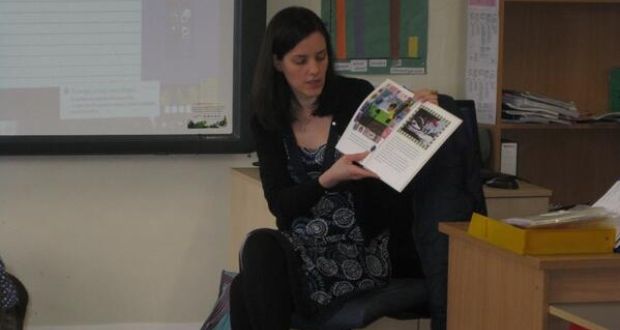
Overcoming the Fear of Writing
bcheights.com – Monday April 10, 2017

I think that 7-year-old me had the whole “writing as a full-time thing” nailed down to a science. A few times a week, I’d plop myself in front of a keyboard, cuddle up to a box of apple juice, and begin typing as fast as I could with two fingers whatever stories had emerged in my head. I fervently believed that I could do it all. When I wasn’t allowed to use the computer, I took to writing these stories out by hand. I even made illustrations for most of them. I was a writer and illustrator all at once, and believed myself to be a true tour-de-force.

Kameron Hurley: How to Write a Book in a Month
locusmag.com – Monday April 10, 2017

We all want to learn how to write books faster. The pace of the news cycle today has heated up to such an extent that for those of us who aren’t in the 1% of writers, if we don’t come out with a book a year, it feels like the world has forgotten us amid the buzz of ever more intensifying world horror. I’m not immune to this pressure. Juggling a day job, a book a year (writing), a book a year (promoting), and completing various freelance articles like this one takes its toll. Stuff goes out late. It’s pushed out. It squeezes in just under the wire (like this column). At some point when you’re on the writing treadmill, it feels like you’ve gotten so behind that you’ll never catch up again.
Is Book Publishing Too Liberal?
publishersweekly.com – Saturday April 8, 2017
When Simon & Schuster announced in late February that it is canceling Milo Yiannopoulos’s book, Dangerous, many in the publishing industry reacted with a sigh of relief. The six-figure book deal that the right-wing provocateur landed at Threshold Editions, S&S’s conservative imprint, late last year caused a wave of criticism—from various factions of the media, the public, and the house’s own authors. And, though it’s still unclear what ultimately motivated the publisher to yank the book, the fervor that the alt-right bad boy’s deal caused put some on alert. Could other publishers be pressured into canceling books by controversial conservatives? Does the industry have a double standard for authors on the right? Does it matter?

4 strategies for writing story endings
poynter.org – Thursday April 6, 2017

A writer can face many problems in ending a story. Time may run out, or space on the page, so that the ending really says: “I stopped writing here.” The story may lack focus or a problem may not be clearly defined so that an ending strategy appears forced or contrived. Some endings are stale and conventional, the equivalent of riding off into the sunset. Or the ending may be hiding somewhere in the last four or five paragraphs of the working draft.

‘Just five more minutes …’: the joy of writing for children
irishtimes.com – Thursday April 6, 2017

There’s something magical about writing for 9-12-year-olds. I have loved books all my life, but it was at this age that I remember most clearly the overwhelming compulsion to keep reading, to find out what happens next, just one more chapter, just five more minutes. It’s the age when you first discover the joys of reading by torchlight under your duvet, the rest of the house quiet, hoping you won’t be caught before your hero escapes from the bad guys.
Considering Getting a Literary Agent? Why You May or May Not Need One
snhu.edu – Thursday April 6, 2017
As a writer, the road to publication can be fraught with a mix of unexpected opportunities and challenges. Like anything else, though, the more you know about what could happen, the better prepared you'll be to overcome setbacks and move forward to success.
A Novelist's Story
Novelist Derrick Craigie, also the associate dean of faculty for creative writing and literature online at Southern New Hampshire University, shares his experience and offers insights into the world of publication for fiction writers.
Writing in the time of great editors
mysanantonio.com – Tuesday April 4, 2017
Editors are the invisible hands that guide publishers and help writers strengthen their craft to achieve greatness. When thinking of greatness, I am reminded of Malvolio’s soliloquy in Shakespeare’s “Twelfth Night” when he says: “Some are born great, some achieve greatness, and some have greatness thrust upon ’em.”
Scrivener & Sons’ editor Maxwell Perkins was one of those born great. He edited Ernest Hemingway’s liberal use of salty language and fear of semicolons, resolved F. Scott Fitzgerald’s hesitation for book titles (Perkins replaced “Trimalchio in West Egg” with “The Great Gatsby”) and hacked off Thomas Wolfe’s purple prose and redundancy.

What Is Camp NaNoWriMo? 7 Tips For A Successful Writing Month
bustle.com – Sunday April 2, 2017

At some point, all budding writers have fantasized about leaving their hectic lives behind and heading off to a cabin in the woods for some uninterrupted writing time. Sadly, most of us are a little too busy to do that — but the upcoming Camp NaNoWriMo in April might be the second best thing. Camp NaNoWriMo describes itself on its website as "an idyllic writer's retreat, smack-dab in the middle of your crazy life" — and can you think of anything more perfect than that?

How to get a job in digital publishing
thebookseller.com – Wednesday March 29, 2017

No doubt you’ve heard many times about how competitive publishing is - and I’m not going to say otherwise. However, as someone ‘on the inside’ who recruits new employees for entry-level roles in the ebooks department at Penguin Random House, it’s part of my job to hold open the door for newcomers. Who might just be you.

7 Tips For Writing A Bestselling Science Fiction Novel
femalefirst.co.uk – Monday March 27, 2017

Don’t try to write a best-selling book. Because you can’t. One, if you just try to copy the current set of bestsellers, you’re already behind. If you can spot a trend, it’s because you’re behind it. Two, because no one really knows what things are going to be bestsellers. Publishers spend a lot of money promoting books that they want to be huge that don’t sell, while other books seemingly come out of nowhere and just perch on the top of lists.
Get the free newsletter | Submit a news item or article | Get Writers' News for your website





